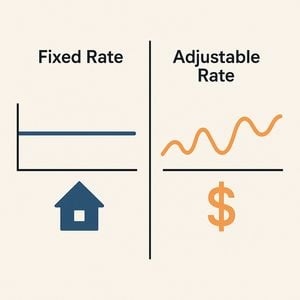When you're shopping for your first home, one of the biggest decisions you'll face is choosing between a fixed-rate mortgage and an adjustable-rate mortgage (ARM). I know it can feel overwhelming—especially when you're already juggling down payments, inspections, and all the other moving pieces of buying a home.
Let me break this down in simple terms so you can make the best choice for your family's situation.
What Is a Fixed-Rate Mortgage?
A fixed-rate mortgage is exactly what it sounds like: your interest rate stays the same for the entire life of your loan. Whether you get a 30-year or 15-year mortgage, that rate you lock in on day one is the rate you'll have until you pay off the house or refinance.
Example: If you get a 30-year fixed-rate mortgage at 7.2% today, you'll pay 7.2% whether it's year 1 or year 25 of your loan.
What Is an Adjustable-Rate Mortgage (ARM)?
An adjustable-rate mortgage starts with a fixed rate for a certain period (usually 3, 5, 7, or 10 years), then adjusts periodically based on market conditions. The most common is a 5/1 ARM, which means your rate is fixed for 5 years, then adjusts once per year after that.
Example: You might start with a 5/1 ARM at 6.5% for the first five years. After that, your rate could go up or down based on market rates, but there are usually caps on how much it can change.
The Real Difference: Predictability vs. Flexibility
Fixed-Rate Mortgages: The "Sleep Well at Night" Option
Pros:
- Complete predictability: Your monthly payment never changes
- Protection against rising rates: If rates go up, you're locked in at your lower rate
- Simple budgeting: You know exactly what you'll pay for housing every month
- Peace of mind: No surprises, no stress about rate changes
Cons:
- Higher starting rate: Fixed rates are typically higher than the initial ARM rate
- No benefit from falling rates: If rates drop significantly, you'd need to refinance to benefit
- Higher payments initially: Could limit your buying power or monthly cash flow
Adjustable-Rate Mortgages: The "Strategic Play" Option
Pros:
- Lower initial rate: Often 0.5% to 1% lower than fixed rates
- Lower initial payments: More buying power or extra money in your pocket early on
- Potential for lower rates: If market rates fall, your payment could decrease
- Good for short-term ownership: Perfect if you plan to move or refinance before the rate adjusts
Cons:
- Payment uncertainty: Your payment can go up (sometimes significantly)
- Budget challenges: Harder to plan long-term finances
- Interest rate risk: If rates rise dramatically, your payment could become unaffordable
- Complexity: More moving parts to understand and track
Real-Life Scenarios: When Each Makes Sense
Choose Fixed-Rate If:
- This is your "forever home" or you plan to stay 7+ years
- You value predictable monthly payments over potential savings
- You're already stretching your budget and can't handle payment increases
- Current rates are reasonable and you want to lock in that stability
- You're risk-averse and prefer certainty over potential rewards
Choose ARM If:
- You plan to move or refinance within 5-7 years
- You want maximum buying power now and can handle some uncertainty
- You expect your income to increase significantly over time
- You're comfortable monitoring rates and potentially refinancing
- Current ARM rates offer substantial savings over fixed rates
The Numbers Game: A Real Example
Let's say you're buying a $500,000 home with 10% down ($450,000 loan):
30-Year Fixed at 7.2%: $3,046/month 5/1 ARM starting at 6.5%: $2,843/month
That's $203 less per month initially with the ARM—$2,436 less per year. But remember, after year 5, that ARM payment could go up based on where rates are then.
What I'm Seeing in Today's Market
Right now, many of my first-time homebuyer clients are choosing fixed rates despite the higher payments. Why? Because rates have been volatile, and most people prefer the security of knowing their payment won't change.
However, I've also helped several clients choose ARMs when:
- They're young professionals expecting significant salary increases
- They're planning to upgrade to a larger home within 5 years
- They need the lower payment to qualify for their target home
- They're disciplined savers who will use the payment difference to build wealth
Questions to Ask Yourself
Before deciding, get honest about these questions:
- How long do you realistically plan to stay in this home?
- Is your income stable and likely to grow?
- How would a $300-500 monthly payment increase affect your budget?
- Are you the type of person who loses sleep over financial uncertainty?
- Do you have emergency savings to handle payment increases?
My Professional Recommendation
For most first-time homebuyers, especially those planning to stay in their home long-term, I typically recommend fixed-rate mortgages. The peace of mind and payment predictability usually outweigh the potential savings from an ARM.
However, ARMs can be powerful tools for the right borrower in the right situation. The key is being honest about your risk tolerance, future plans, and financial stability.
Bottom Line
There's no universal "right" answer—only what's right for your specific situation. The best mortgage is the one that aligns with your financial goals, risk tolerance, and life plans.
Don't let anyone pressure you into either option without fully understanding the implications. Take time to run the numbers, consider different scenarios, and choose the option that lets you sleep well at night while building equity in your new home.
Ready to explore your options? Let's talk about which mortgage type makes sense for your specific situation. Every family's path to homeownership is different, and I'm here to help you find yours.
Remember: This information is for educational purposes. Mortgage rates and terms vary based on credit, income, and market conditions. Always consult with a qualified loan officer for personalized advice.


